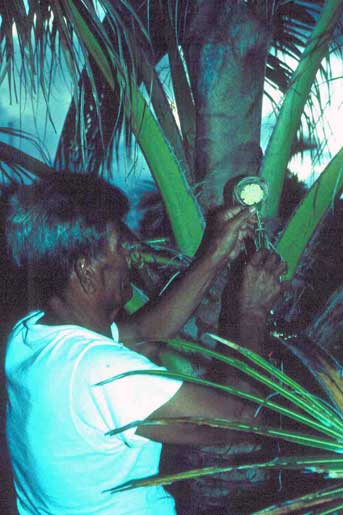
Tapping the sap of a coconut tree for jimañūñ |
In most of the world, certain plants are used for psychoactive (mind-altering) purposes. Tobacco (legal) and marijuana (illegal) are two examples of plants that produce an altered state of consciousness. Some of these psychoactive plants, and the mind-altering substances made from them, are referred to as "intoxicants." A true intoxicant is a substance that is toxic to the human body, especially in a large dose. Alcoholic beverages can be extremely intoxicating when large amounts are consumed.
The beverage jimañūñ, fermented from coconut sap (jekaro), can be psychoactive because of its alcohol content, and if a sufficient amount (depending on many factors) is consumed, a person can become intoxicated. Records of early European visitors indicate that the Marshallese did not ferment alcohol from coconut sap before the arrival of these outsiders. It thus appears that prior to contact, the Marshall Islands was one of the few places in the world where no psychoactive substances were consumed, either because the necessary plants were not present (e.g., tobacco or marijuana) or because the process of obtaining an intoxicating drink from an existing plant was not part of the cultural inventory. |

